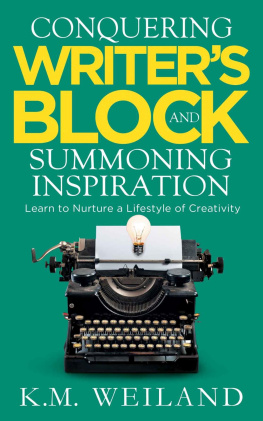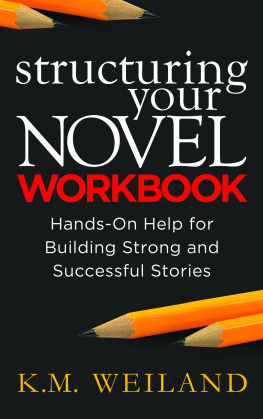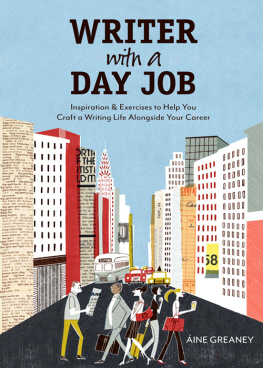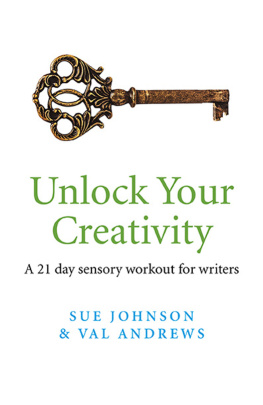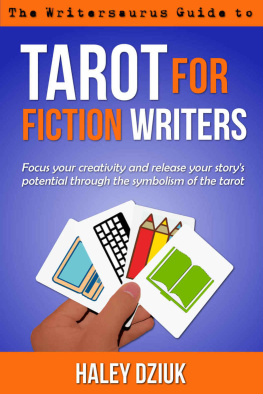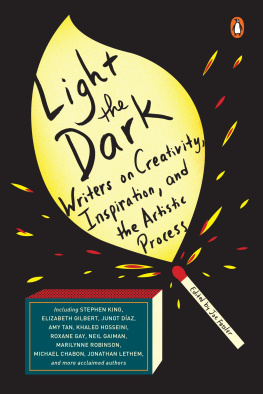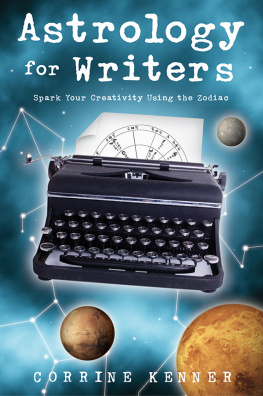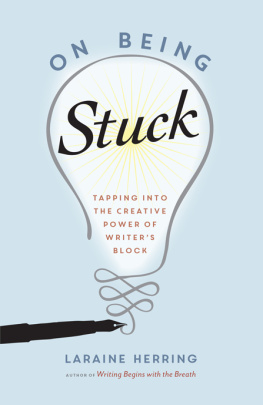Contents
CONQUERING WRITER'S BLOCK AND SUMMONING INSPIRATION
Learn to Nurture a Lifestyle of Creativity
K.M. Weiland
PenForASword Publishing
Position yourself to live an inspired life and send the dreaded writers block packing.
Inspiration is a slippery thing at the best of times. But as a writer, you cant afford to wait around on Madam Muses goodwill. In this encouraging e-book, award-winning author K.M. Weiland shows you how to nurture creativity and put it at your summons, rather than the other way around. After reading this book, you will be able to:
- Build a lifestyle that encourages inspiration
- Say goodbye to destructive guilt over wasting time on creative endeavors
- Discover why inspiration isnt so much a feeling as an act of will
- Understand what to do when your best-laid writing plans go awry
- Use your non-writing time to boost your creative energy
- Apply specific tips to prevent and combat writers block
- Instill habits for improving your efficiency and commitment as an author
Nurture a lifestyle of creativity that will keep your fingers flying over the keyboard!
Join the discuss: #ConqueringWritersBlock
Introduction
IF YOURE LIKE most writers, coming up with story ideas is rarely a problem. More than likely, your brain bubbles over with more ideas than youll be able to use in two and a half lifetimes. Ive yet to meet a writer who decided, Hmm, Id like to be an author and then sat down to brainstorm ideas. Instead, most of us turned to writing as a way to release the pressure of the ideas already ricocheting around in our brains.
The problem isnt that we have too few ideas, but rather that well never live long enough to write the ideas we already have. Of course, that really isnt a problem; its a tremendous blessing. And if a little blessing is good, a lot of blessing must be even better, right? If a little bit of inspiration has us soaring up near the ceiling, why not go whole hog and open ourselves to inspiration in every possible way?
Ultimately, inspiration is an intensely personal experienceunrepeatable and often unresponsive to conscious prodding. You cant force inspiration. It either happens or it doesnt. You cant sit yourself down at your desk, squeeze your eyes shut, and demand inspiration appear in front of you complete with drum roll and puff of smoke. Inspiration is a gift, and like all gifts it must be treated with gratitude and responsibility.
But none of this is to say we cant position ourselves in the path of inspiration. Instead of just waiting around for the muse to hit us in the head with a lightning bolt, we can ingrain the habit of opening ourselves to inspiration.
In the following pages, well be exploring this most important and, in some ways, trickiest aspect of the writing life. Ill be sharing tricks for vanquishing that dreaded bugbear of all authorswriters blockand offering ideas on cultivating a lifestyle and writing routine that nurtures inspiration.
K.M. Weiland
September 2014
Chapter 1: How to Be Inspired Every Day
LETS START WITH a handful of tips for composing an invitation Madam Muse wont be able to resist.
Tip #1: Pay Attention to the Details
Writing is the details. Without these little garnishes, most stories could easily be summed up in a sentence or two. People read fiction because they want to experience life. They want to see the way the dust motes turn to gold in a shaft of sunlight, and they want to smell the delicate spray of an orange rind as it is peeled back.
In order to share all these minutiae with readers, we first have to notice them ourselves. But dont just notice them; experience them. In the end, a story is about the little things as much, if not more, than the grand scope of life and death. So pay attention to the color of the sky right before the sun dips below the horizon, notice the way the bass in a sound system thrums in the soles of your feet, absorb the smell of rain so deeply that you can describe it instinctively. Paying attention to the details will plump up your prose, but even betterwho knows when youll stumble upon some inconsequential and heretofore unnoticed intricacy that will prompt your next story?
Tip #2: Look Beyond the Clich
Keep your eyes wide open for the unexpected. Look beyond the obvious in search of dichotomies. Broaden your horizons; start searching for esoteric and little-known nuggets. When you find an idea for a story that could easily turn into a familiar plot, hang on to it for a bit while you search for an unexpected ingredient to throw into the mix.
Lets say you want to tell a mystery story. Dont settle for a tale about a hard-boiled cop in an inner-city district. Dig deeper. What would be unexpected? What would be out of the ordinary? A story isnt ready to be written until youve been able to add at least two or three layers of juxtaposition.
Tip #3: Wait for Your Subconscious
Never underestimate your subconscious. When you reach a snarl in your plot, dont think too hard. You can only push your conscious brain so far. After backing myself and my characters into a seemingly insurmountable corner, Ive often sat at the keyboard for hours, racking my brain for an answer that just wouldnt come. But when I return to the problem the next day, after my subconscious has had a chance to mull on the matter overnight, the solution is usually staring me in the face.
When you come across a snippet of an idea you arent quite certain how to develop, toss it into your subconscious for a while. Sometimes an idea stews in the back of my mind for years before suddenly reappearing on center stage as something worth pursuing.
Tip #4: Put Your Conscious Mind to Work
Nobody says you have to wait for inspiration to come to you. Put your conscious mind to work and brainstorm. Give yourself idea deadlines (for example: Im going to come up with a new story idea every day ). Buy a book of journaling prompts (such as Jack Heffrons The Writers Idea Book ) or google one of the hundreds of websites that offer prompts. Schedule idea-hunting day trips and sally forth with notebook and pen in hand.
Tip #5: Dont Wait for Inspiration
Wed all like to take up permanent residence in that rarefied atmosphere where the inspiration high is a constant. But as all writers discover, that high inevitably dissipates. If we allow our writing to dissipate with it, well never finish a story, much less be read by anyone.
How Not to Be Inspired
Living an inspired life can be tougher than it looks. So many little things can creep into our lives and steal our creativity when were not paying attention. Take a look at some of the following habits. Are any of them killing your creativity?
1. Sleep First, Write Later
As someone who claims sleep as a favorite hobby, Ill be the first to tell you that when I give in to the urge to slap my snooze button, instead of dragging myself out of bed to see what my characters are up to, inspiration never has a chance.
2. Fail to Set Goals
Goals, even modest goals, are one of the best ways to stay motivated and, in turn, to stay inspired. If you have a grand vision for the future of your writing, inspiration will ooze right out of you. This is how Mt. Rushmore and the Golden Gate Bridge were builtwhy not your magnum opus as well?
3. Allow Others to Guilt You Out of Your Writing Time
Non-writers often fail to understand our need to craft fiction. But thats no reason to let them convince you your writing isnt important. You must first make your writing a priority in your own life. Family and friends will eventually get the hint.
4. Fritter Away Your Writing Time on Unimportant Details
Writing is the most exciting pursuit in the worlduntil we actually have to sit down and start typing. In the face of that daunting blank page, its far too easy to wimp out and start in on easier tasks: dusting the monitor, editing and re-editing what we wrote yesterday, or maybe even sharpening all our pencils to precisely the same length.
Next page
